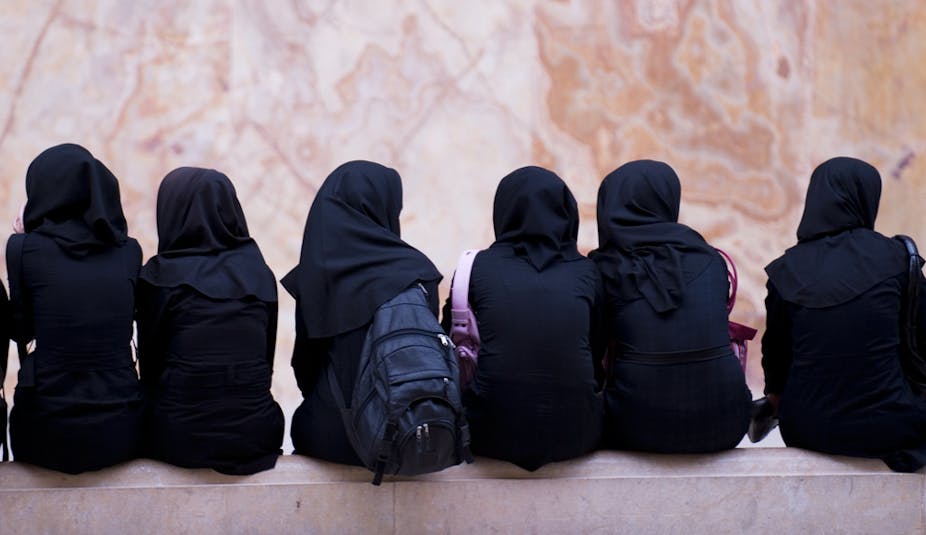The fallout from an event at the University of Melbourne where women and men were asked to sit separately has been intense.
The media coverage so far has focused on the issue of segregated seating in a public space, with many using raw and emotive language to denounce the university and the Islamic community group involved.
It’s clear that the university should be considering its role as a public institution and pay closer attention to communicating its guidelines for venue hire. But the university should be reproached for another reason.
Seating and equality
Gender segregation is contested amongst Muslims worldwide. In Australia, a Muslim who walks into a gender segregated room instantly decodes the “culture” of that room. You can stay, you can leave, or you can argue. Freedom of choice exists. But if you want to join a club, you are obliged to play by club rules.
In the case of events at the Copeland Theatre on 13 April, no-one was forced to sit anywhere against their will. Seating was suggested with two signs, one pointing to an entrance for “brothers” and the other towards an entrance for “sisters”.
The event organiser, Hikmah Way’s preferred seating arrangements raise questions about gender differentiation in public settings and whether it is respectful and empowering, as they would argue, or backward and “humiliating” as others believe.
The university should have been aware that this group was likely to have specific guidelines for gender-mixed gatherings and provided clear directives on the matter. But alarm bells should have also rung for the University of Melbourne over the premise and content of this meeting.
Violent rhetoric
The promotional material for the event “Islamic rulings on Jihad in Syria” refers to Islamic scholars of great note. One is 13th Century scholar Ibn Taymiyyah who is credited with founding the Islamic political movement known as “Salafism”. Adherents to this movement seek a return to the Golden Age of “Al Salaf Al Saleh”, the first generation of Muslim leaders.
Ibn Taymiyyah’s teachings champion universal Islamic Sharia Law and urge any action that is Islamically possible against non-conformers to this vision. His fatwas explicitly promote violence to purge infidels - Christians, Shia sects, and Sunni Muslims who do not agree with Salafist objectives.
Salafists in Australia garner support for violent jihad in Syria by reference to the teachings of Ibn Taymiyyah, collecting donations for humanitarian aid for Mujahidin (Islamic rebel fighters) in Syria.
The Salafist modern era voices are Sheikh Yusuf Al Qaradawi, an Egyptian now based in Qatar, and Sheikh Adnan Al Arour, a Syrian now based in Saudi Arabia. Both are outspoken in their call for violence in Syria.
Qaradawi pronounces that the death of one third of the Syrian population is a small price to pay for the downfall of the “infidel” government. Arour encourages killing not only people who actively oppose, but also those who do not support, the fight against the Syrian government. Last year he infamously pronounced that such “infidel” corpses should be minced and fed to the dogs.
The religious agenda of combatants in Syria is at odds with activists and the broader population who had hoped for a newly imagined democratic Syria achieved through peaceful means.
So when Hikmah Way’s promotion arrived in my inbox, it was not its content that surprised me. It was the venue.
Promotion of pursuit of an Islamic state ruled by Sharia Law at whatever cost - even through the slaughter of non-conforming humans - has no place at an Australian university.

It is analogous to permitting a right-wing Christian group to promote a Crusade to Syria to “rescue” it from non-Christians. Or permitting a radical Christian group to promote ethnic cleansing of Israel to make way for the Messiah.
The role of the university
The event title alone should have alerted University of Melbourne venue hire. Ignorance of Islam and of politics in Syria is the real story here.
The University of Melbourne campus has been used as a cover of “legitimacy” for an Islamic political movement on the premise that universities aspire to be accessible to a full diversity of ideas. But the university shouldn’t be used in this way by these kinds of groups.
Ironically, prior to the rapid disintegration of Syria in the past 12 months in particular, Syrian schools and universities enrolled as many women as men, and all classes were mixed. But if the supporters of Hikmah Way and sectarian-based fighters in Syria get their way, gender segregation will be enforced.
Of course, we need discussion about gender segregation and whether it has any place in universities, even within external groups who use the facilities. But public commentators also need to look more closely at groups like Hikmah Way and what they’re espousing in our universities.

